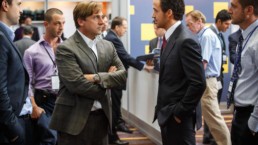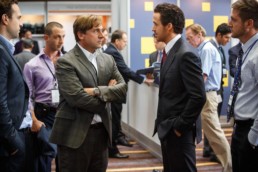Review: ‘The Big Short’
The Big Short is a raucous look at the real-life financial meltdown of 2008.
The economic collapse of the twenty-first century destroyed many family’s futures and devastated markets across this country and many others–so why does a movie about just that feel like so much fun? Leave it to the director of Anchorman and Step Brothers to spin the real-life story behind Wall Street’s deceptive and unethical trading that led to the global financial crisis into a comical and entertaining watch in the new movie The Big Short.
Based on the 2010 novel, “The Big Short: Inside the Doomsday Machine” by author Michael Lewis, director Adam McKay puts his spin on telling the real-life story of four guys who foresaw the growing housing bubble years before it burst, and who decided to risk it big by betting against (or, “shorting”) those seemingly safe assets to stand up to big banking’s greed.
The Big Short enlists a star-studded cast to play such fun, caricatured characters that make learning about banking terms fun, including Christian Bale as Michael Burry, the genius-level trader who first noticed the unsustainable trends. The film’s partial narrator, Ryan Gosling, plays Jared Vennett, a young fiery trader who also bets against the housing crisis, and looks directly into the camera to explain real instances from time to time. Steve Carell plays Mark Baum, a high-strung trader whose early paranoia leads him to take the advice of Vennett and jump into shorting, and who also serves as the movie’s most outright moral compass. Brad Pitt also co-stars as a somewhat reclusive trader Ben Rickert.
‘The Big Short’ is more of a Trojan Horse of a movie intent on explaining just what all exactly led to the financial meltdown–it’s informative and educational, putting Lehman Brothers in layman’s terms, if you will.
The inevitable hurdle that a film like this must overcome in order to connect with the audience is to explain to the audience the banking terms and financial practices that led to the collapse in the easiest way possible. Part screwball comedy, The Big Short is more of a Trojan Horse of a movie intent on explaining just what all exactly led to the financial meltdown–it’s informative and educational, putting Lehman Brothers in layman’s terms, if you will. The film breaks the fourth wall early and often and unashamedly, regularly pausing the narrative to define or explain some banking terminology or otherwise. This leads to unexpectedly funny moments like Selena Gomez (as herself) explaining to the audience what a credit default swap is.
Stylish and fun, The Big Short plays fast and loose throughout its 130-minute-long run time, necessary for the largely all-over-the-place structure of the story. But this same effect also can’t help but rattle around the idea that, besides learning that Wall Street might have been up to shady dealings, that it exposes weak or nonexistent parts of the story that don’t add on top of previous learnings.
The better and the worst part of the movie is that we already saw a financial mad-cap set up recently, and with enough pizzaz from Scorsese that it still casts its shadow over this one. In fact, a few instances recall The Wolf of Wall Street enough–the irresponsibility of alpha-dog traders, the talking directly into the camera bit, heck, even Margot Robbie doing so in a bath tub, that it can’t help but be compared to the raucous Leo DiCaprio starrer.
For what it’s worth, The Big Short is a solid, funny effort that wants to have its fun by peeling away each layer of the corrupt onion. But it also feels like it might just be peeling the same layer back over and over again, doing the same thing many times, which is pretty much like the traders of this movie.
The Big Short is now playing in theaters. Rated R for pervasive language and some sexuality/nudity.
Ryan Rojas
Ryan is the editorial manager of Cinemacy, which he co-runs with his older sister, Morgan. Ryan is a member of the Hollywood Critics Association. Ryan's favorite films include 2001: A Space Odyssey, The Social Network, and The Master.


